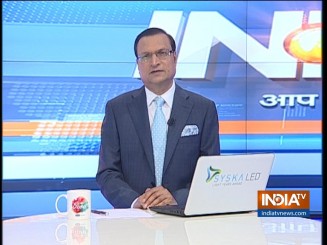 Prime Minister Narendra Modi’s pre-election interim budget placed in Parliament on Friday could become a big game changer during the forthcoming Lok Sabha elections due in April-May. He has given relief to 12 crore small and marginal farmers, 3 crore middle class income tax payers, 30 crore workers in unorganized sector and small businessmen.
Prime Minister Narendra Modi’s pre-election interim budget placed in Parliament on Friday could become a big game changer during the forthcoming Lok Sabha elections due in April-May. He has given relief to 12 crore small and marginal farmers, 3 crore middle class income tax payers, 30 crore workers in unorganized sector and small businessmen.
It was impossible not to notice Congress President Rahul Gandhi sitting glum, holding his chin inside the Lok Sabha as Finance Minister Piyush Goyal read out his budget speech to huge applause from members. The opposition benches were silent as ruling party MPs chanted ‘Modi, Modi’ slogans normally heard at the PM’s rallies.
It was an interim budget only on paper, because Goyal was reading out Modi government’s economic road map for the next 10 years.
The first major sop was to the middle class income tax payer with taxable income upto Rs 5 lakh a year. They will not have to pay tax. The second major sop was to small and marginal farmers having upto 5 acres of land. They will be paid Rs 6000 per annum in three instalments directly to their bank accounts, to be implemented with effect from December last year.
The third major sop was to millions of workers in unorganized sector, who will be getting Rs 3000 monthly pension on attaining the age of 60. The fourth major sop was exemption of TDS on interest from fixed deposits raised from Rs 10,000 to Rs 40,000. Moreover, Rs 1,70,000 crore was earmarked for national food security and Rs 60,000 cr for MNREGA (national rural employment guarantee).
The Rs 6000 per annum payment to small and marginal farmers will be completely funded by the Centre. The farmer community was said to be unhappy with Modi government in recent years, and one reason for the poor poll performance in Madhya Pradesh, Rajasthan and Chhattisgarh was attributed to agrarian unrest. This major sop to small and marginal farmers is expected to douse farmers’ anger to a large extent. The first instalment of Rs 2000 to these farmers will be reaching their bank accounts before March 31, according to Goyal.
Similarly, the middle class was said to be unhappy with Modi government in recent years, particularly since demonetization and GST. With the announcement of ‘no income tax’ for those earning upto Rs 5 lakh a year, it will definitely come as a big relief. Workers in the unorganized sector were mostly ignored by previous governments, and the launching of Rs 3000 monthly pension for them will come as a relief to this section.
If we analyze the manner in which Modi government has handled the economy in the last five years, we can say that on a bigger level, corruption has been eliminated to a large extent in business, officials’ discretion in handing out licences, contracts and routine permissions has been curbed significantly, and at the lower level, leakage in government schemes has been plugged substantially through direct bank transfer. Inflation has been kept under control in the last four and a half years.
Questions were raised regarding slowdown of economy due to demonetization and GST, but even international economists admit that the Indian economy is now the fastest growing economy in the world. Rail, road and aviation infrastructure have got a big fillip.
The only question that remains to be answered is why Modi government failed to create jobs for millions of unemployed youths. The jury is still out on this issue. But if one looks at the overall picture, the banking sector has been strengthened, Mudra loans are being given to small entrepreneurs, new businesses are being set up, the infrastructure sector has become strong, big time corruption has been more or less eliminated. These, in a nutshell, are the major economic achievements of Modi rule. The credit for laying the foundation of fiscal management that made these pre-election sops possible surely goes to Arun Jaitley, who steered the Finance Ministry for four and a half years, and did much of the spadework for the current interim budget, before he had to leave for the US for surgery. He has recovered and wll return next week.